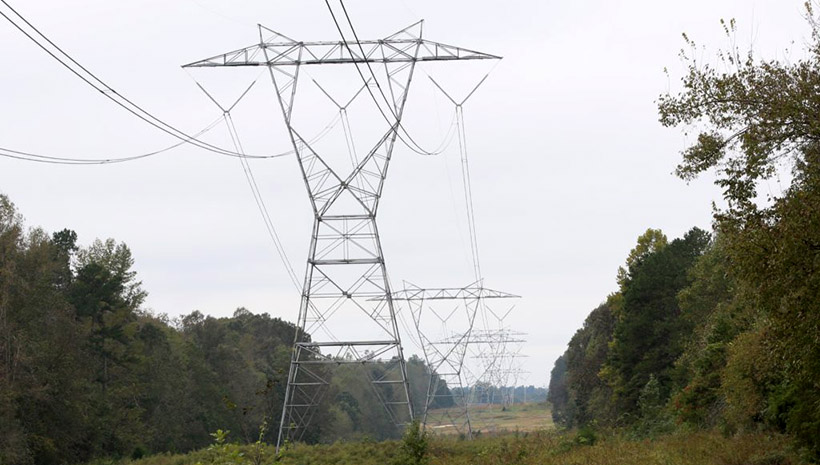A Constitutional Republic, where the First Amendment is Essential to OUR Survival
Duke Energy Is Right on Gas
Publisher's note: This post appears here courtesy of the Carolina Journal, and written by John Hood.

Duke Energy can't win.
Well, perhaps I should clarify that. Duke is a gigantic company with lots of institutional and political heft. It wins plenty of battles. But when it comes to energy policy, the company finds itself surrounded by warring factions that, despite manifest differences, agree on one thing: Duke Energy is on the wrong side.
Conservatives dislike Duke Energy's eagerness to embrace renewable-energy incentives and mandates that squander resources and raise costs. Progressives think Duke Energy isn't going nearly fast enough to embrace renewable energy, and strongly dislike the current policy of replacing coal primarily with natural gas. Gov. Roy Cooper won't go along with the company's preferred approach to coal ash and grid modernization. And just about everyone except Duke Energy thinks it deserves more competition.
I'm not going to whip out my violin and start a plaintive song. As Ronald Reagan once said about the federal deficit, I think Duke Energy is big enough to take care of itself. But I do feel it necessary to point out that when it comes to renewable energy, the progressive demands on the company are fantastical, not feasible.
Duke Energy touts the fact that its total carbon emissions are down 31 percent from their peak in 2005. It hopes to reach a cumulative 40 percent reduction by 2030. Dionne Delli-Gatti of the Environmental Defense Fund told the Charlotte Business Journal that this target was not nearly aggressive enough. "We would like to see a commitment to retiring coal faster," she said, "and we would like to see them not rely so much on natural gas to replace coal."
Let's get real. The vast majority of the decline in Duke's carbon emissions came from the combination of greater efficiency and greater reliance on natural gas. In 2005, coal plants generated 60 percent of North Carolina's electricity. Natural gas was a trivial 2 percent. As of 2018, coal is 24 percent and gas is 33 percent. Nuclear remained roughly the same at 31 percent.
Investment in North Carolina solar generation grew by leaps and bounds during this period, to be sure, but from a low base - virtually none in 2005 to 5 percent of generation in 2018.
If production costs continue to fall, I assume solar will continue to grow even if there is no heavy hand of government tipping the scales in its direction. But could it take the place of natural gas as the main replacement for coal? Could it and other renewables also displace the need for baseload generation by nuclear plants, as some activists contend? Not under any realistic scenario I've ever seen. Consider these facts from Mark Mills, a Manhattan Institute fellow and the co-director of Northwestern University's Institute on Manufacturing Science and Innovation:
Might some future technological innovation change the calculus dramatically? No. There are some basic physical limitations here. The "maximum theoretical energy in a pound of oil is 1,500 percent greater than maximum theoretical energy in the best pound of battery chemicals," Mills pointed out.
If your goal is to reduce carbon emissions in electricity generation, the primary tools available are to replace coal with lower-emitting natural gas and to expand nuclear. Criticizing Duke Energy's policies is fair game. Demanding that it break the laws of physics is not.
John Hood (@JohnHoodNC) is chairman of the John Locke Foundation and appears on "NC SPIN," broadcast statewide Fridays at 7:30 p.m. and Sundays at 12:30 p.m. on UNC-TV.
Go Back

Photo: Don Carrington/Carolina Journal
Duke Energy can't win.
Well, perhaps I should clarify that. Duke is a gigantic company with lots of institutional and political heft. It wins plenty of battles. But when it comes to energy policy, the company finds itself surrounded by warring factions that, despite manifest differences, agree on one thing: Duke Energy is on the wrong side.
Conservatives dislike Duke Energy's eagerness to embrace renewable-energy incentives and mandates that squander resources and raise costs. Progressives think Duke Energy isn't going nearly fast enough to embrace renewable energy, and strongly dislike the current policy of replacing coal primarily with natural gas. Gov. Roy Cooper won't go along with the company's preferred approach to coal ash and grid modernization. And just about everyone except Duke Energy thinks it deserves more competition.
I'm not going to whip out my violin and start a plaintive song. As Ronald Reagan once said about the federal deficit, I think Duke Energy is big enough to take care of itself. But I do feel it necessary to point out that when it comes to renewable energy, the progressive demands on the company are fantastical, not feasible.
Duke Energy touts the fact that its total carbon emissions are down 31 percent from their peak in 2005. It hopes to reach a cumulative 40 percent reduction by 2030. Dionne Delli-Gatti of the Environmental Defense Fund told the Charlotte Business Journal that this target was not nearly aggressive enough. "We would like to see a commitment to retiring coal faster," she said, "and we would like to see them not rely so much on natural gas to replace coal."
Let's get real. The vast majority of the decline in Duke's carbon emissions came from the combination of greater efficiency and greater reliance on natural gas. In 2005, coal plants generated 60 percent of North Carolina's electricity. Natural gas was a trivial 2 percent. As of 2018, coal is 24 percent and gas is 33 percent. Nuclear remained roughly the same at 31 percent.
Investment in North Carolina solar generation grew by leaps and bounds during this period, to be sure, but from a low base - virtually none in 2005 to 5 percent of generation in 2018.
If production costs continue to fall, I assume solar will continue to grow even if there is no heavy hand of government tipping the scales in its direction. But could it take the place of natural gas as the main replacement for coal? Could it and other renewables also displace the need for baseload generation by nuclear plants, as some activists contend? Not under any realistic scenario I've ever seen. Consider these facts from Mark Mills, a Manhattan Institute fellow and the co-director of Northwestern University's Institute on Manufacturing Science and Innovation:
- Over a 30-year period, $1 million worth of utility-scale solar or wind produces 40 million and 55 million kilowatt-hours of power respectively. By comparison, $1 million worth of shale well produces enough natural gas to generate 300 million kilowatt-hours over that period.
- It costs less than $0.50 to store a barrel of oil, or its equivalent in natural gas, but it costs $200 to store the equivalent energy of a barrel of oil in batteries. It also takes the energy equivalent of 100 barrels of oil to fabricate a quantity of batteries that can store the energy equivalent of a single barrel of oil, and would require vast mining operations to produce the necessary minerals.
Might some future technological innovation change the calculus dramatically? No. There are some basic physical limitations here. The "maximum theoretical energy in a pound of oil is 1,500 percent greater than maximum theoretical energy in the best pound of battery chemicals," Mills pointed out.
If your goal is to reduce carbon emissions in electricity generation, the primary tools available are to replace coal with lower-emitting natural gas and to expand nuclear. Criticizing Duke Energy's policies is fair game. Demanding that it break the laws of physics is not.
John Hood (@JohnHoodNC) is chairman of the John Locke Foundation and appears on "NC SPIN," broadcast statewide Fridays at 7:30 p.m. and Sundays at 12:30 p.m. on UNC-TV.
Latest Op-Ed & Politics
|
illegal alien "asylum seeker" migrants are a crime wave on both sides of the Atlantic
Published: Thursday, April 18th, 2024 @ 8:10 am
By: John Steed
|
|
UNC board committee votes unanimously to end DEI in UNC system
Published: Thursday, April 18th, 2024 @ 7:54 am
By: John Steed
|
|
this is the propagandist mindset of MSM today
Published: Wednesday, April 17th, 2024 @ 3:04 pm
By: John Steed
|
|
Police in the nation’s capital are not stopping illegal aliens who are driving around without license plates, according to a new report.
Published: Wednesday, April 17th, 2024 @ 8:59 am
By: Daily Wire
|
|
same insanity that created Covid
Published: Wednesday, April 17th, 2024 @ 8:58 am
By: John Steed
|
|
Davidaon County student suspended for using correct legal term for those in country illegally
Published: Wednesday, April 17th, 2024 @ 7:23 am
By: John Steed
|
|
given to illegals in Mexico before they even get to US: NGOs connected to Mayorkas
Published: Tuesday, April 16th, 2024 @ 11:36 am
By: John Steed
|
|
committee gets enough valid signatures to force vote on removing Oakland, CA's Soros DA
Published: Tuesday, April 16th, 2024 @ 10:32 am
By: John Steed
|
|
other pro-terrorist protests in Chicago shout "Death to America" in Farsi
Published: Monday, April 15th, 2024 @ 9:13 pm
By: John Steed
|
|
claim is needed "to meet climate targets
Published: Monday, April 15th, 2024 @ 2:07 pm
By: John Steed
|
|
Only two of the so-called “three Johns” will be competing to replace Sen. Mitch McConnell (R-KY) as leader of the Senate GOP.
Published: Monday, April 15th, 2024 @ 12:50 pm
By: Daily Wire
|
























